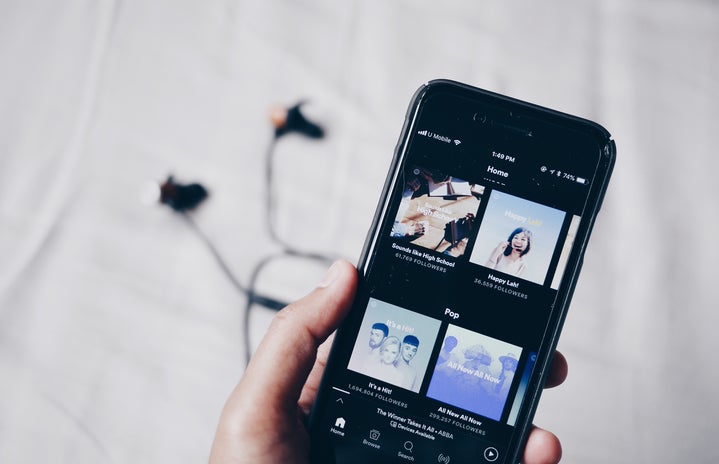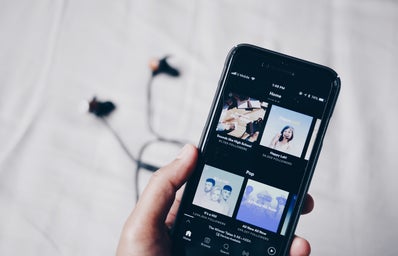Social media’s takeover has created constant projections of our lives fit for others’ viewing, consumption, and judgment. What we do is rarely private and highly curated. While many I know are increasingly forgoing social media due to mental health, self-esteem, or its ‘time-wasting’ capabilities, most still engage in one way or another. Although it contains a multitude of functions, its base stems from sharing something about yourself, which will typically result in some form of validation. Likes, comments, and shares seem to be the extent of responses available. Expansion has thus consisted of the content we share and the platforms we do it on.
Platforms that promote art – Spotify, Goodreads, Letterbox, and others of these parties – have the ostensible purposes of streaming music and tracking and discovering books and movies. Yet, such companies have quickly realized that they can monetise off our newfound desire for online validation. I can now follow friends, like playlists, and comment on reading statuses. These features certainly engage users but have an additional purpose of creating a newfound social media of taste.
Ubiquitous social media, such as Instagram, Facebook, VSCO, and BeReal are mainly concerned with broadcasting experiences and smaller moments in our lives. The exceptional events of our weekend, the much too expensive vacation we indulged in, our assumingly fashionable outfits, and delectable meals are all deemed worthy posts. In contrast, ‘posts’ are disguised on Goodreads, Spotify, and Letterbox because the main point typically isn’t to share. You are simply starting a new book; listening to this album and making a playlist; or watching a movie. Yet by using these apps, there is always a conscious choice to broadcast. For example, Spotify and Apple Music allow the choice of publicising your profile and specific playlists. It’s thus a choice to allow your consumption to undergo others’ scrutiny. Yet does having followers and engaging with the app affect how and what we consume? We all love to believe that we are autonomous beings, mostly acting out of free will, capable of dodging external pressures and reactions. We convince that taking photos has no ulterior motive other than improving memory, that it’s irrelevant that one book may impress our friends over another, and that we didn’t watch a movie because it was our crush’s favourite. Yet no matter how independent we claim and believe to be, social media’s draw and impact is difficult to escape; because at the end of the day, we all get a slight flutter of happiness when we get a ‘like’.
Although all will inevitably be impacted by the eyes of others – whether minimally or extensively – this doesn’t necessarily create an exclusively negative result. While the platforms themselves are designed to provide recommendations based on consumption habits, the ability to follow friends or others who share similar tastes can produce a similar benefit. It serves as an additional means of exploration – scouring playlists and five-star ratings an effective way to discover new material. In this sense, it can foster community with people not met in person or enhance connection with those already known. Bonding over shared interests and tastes is a regular occurrence, and these platforms can expose common interests quickly and easily. However, there is potential for the opposite to occur: our ability to search others’ online profiles can also diminish the need to talk about these forms of art in person. It becomes unnecessary to ask if someone liked a book because you can already see they’ve rated it one star or ask what new music they’ve been listening to because you saw it shown up in their recently played. Recommendations and interests may thus become obsolete topics in one of the most important forms of connections: face-to-face conversations.
Additionally, while not everyone looks, the possibility of being watched can be motivating in increasing consumption. This can be positive. Goodreads reading challenges may inspire one to read twenty books instead of ten while music platforms can encourage listening to more albums or artists. Yet there remains a precarious balance between external and internal motivators. While others can hold one accountable, trying to impress or satisfy shouldn’t ever be the sole reason for acting. A pressure is created, where non-completion of a book or a lack of likes on a playlist results in a potential sense of failure. Further, the hackneyed yet accurate ‘quality over quantity’ is also applicable. Monitoring the amount others consume can create the false notion that intake should be frequent instead of effective and meaningful. There will always be someone better than us – at reviewing books, watching old movies, or listening to more obscure albums. Although this shouldn’t matter, it can be difficult to halt our attempts to reach higher standards. Art consumption thus becomes tainted by social media’s imposing pressures of validation as its purpose shifts from enjoying to impressing.
So, do we try to escape it? Can we? Perhaps: by turning off others’ ability to see what we’re listening to or making a profile private and blocking new friends. Yet, most aren’t aware or don’t feel the consequences of broadcasting art consumption. I believe that an awareness of the gaze is a first step to ridding ourselves of others’ expectations and potential judgments. No matter the amount of effort, a part of us will always care about how we’re perceived. However, consciously evaluating the way this impacts our choices is a sure way to ensure that our books, songs, and movies reflect our own taste instead of curating them to someone else’s desires.


